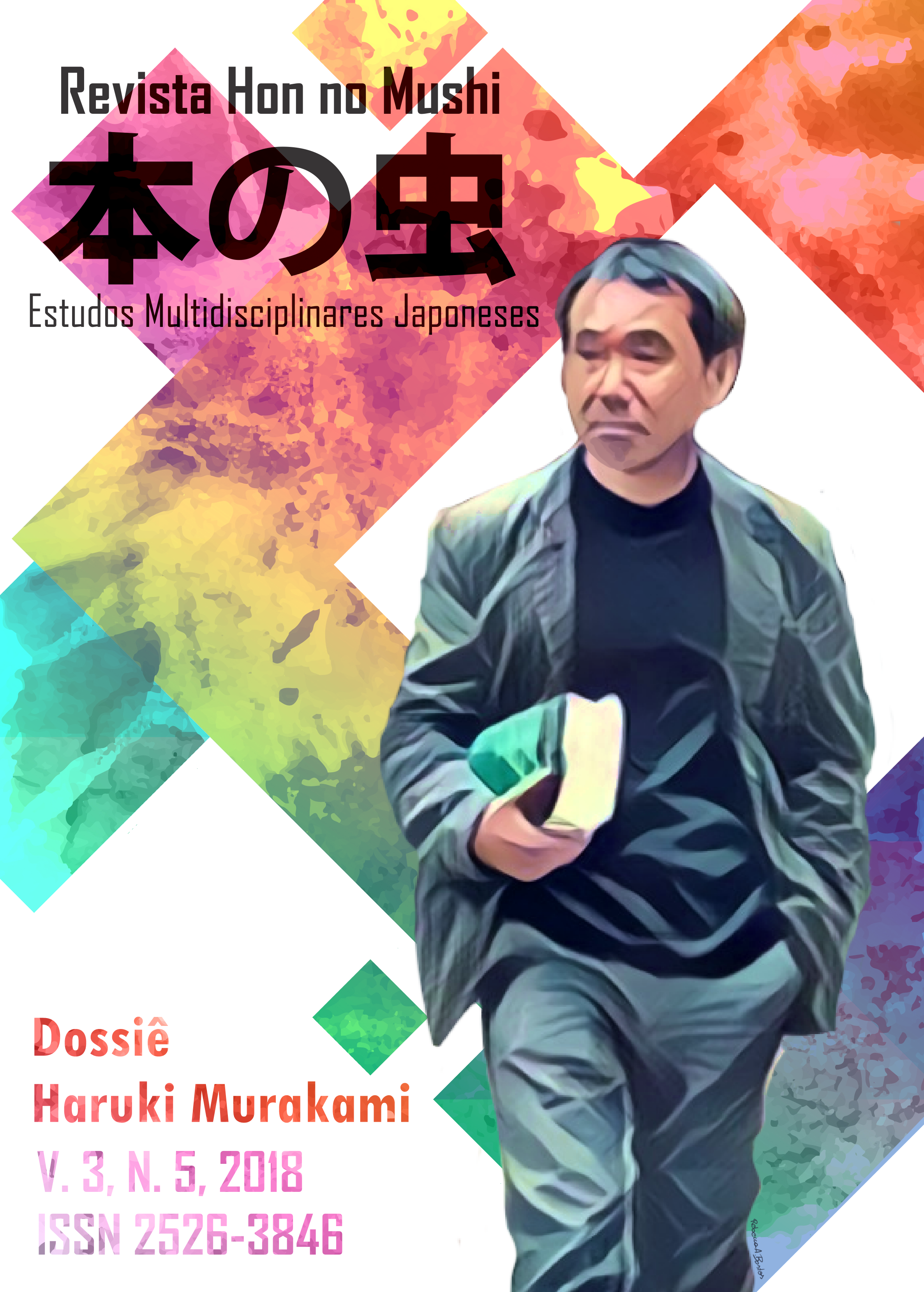IN BETWEEN DUSK AND DAWN: AN ANALYSIS OF THE SPACE-TIME ASPECTS OF AFTER DARK, BY HARUKI MURAKAMI
Keywords:
Time; Space; Haruki Murakami; After Dark; Now.Abstract
This article analyzes the narrative voice and space-time aspects present in After Dark, by Haruki Murakami, published in 2004 and translated in Brazil in 2009. In this way, space and time are intertwined with the cinematographic elements, leading us to experience the narrative as a movie screen. In according with this alternation that is created in relation to the complexity of the plot, doubts arise about the facts that occur there. Therefore, spaces produce diverse feelings and sensations. Time and space do not separate, and bring their functions to the “now”.
Downloads
References
COSTA, Benedito. A travessia dos universos de Haruki Murakami. In Jornal Memai, 2012. Disponível em: <http://www.memai.com.br/2012/05/11-literatura-haruki-murakami/>Acesso em janeiro de 2019.
BACHELARD, G. A poética do espaço. São Paulo: Martins Fontes, 1989.
BORGES FILHO, Ozíris. Espaço e literatura: introdução à topoanálise. Franca: Ribeirão Gráfica e Editora, 2007.
FIORIN, José Luiz. Para entender o texto. São Paulo: Editora Ática, 1995.
FUJITA, Fábio. O Japão ocidental de Haruki Murakami. In FGV, Revista Getúlio, São Paulo, edição 09, pp. 44-47, 2008. Disponível em: <http://bibliotecadigital.fgv.br/dspace/bitstream/handle/10438/7102/Ed.%2009%20-%20Literatura%20%28site%29.pdf?sequence=1&isAllowed=y>. Acesso em janeiro 2019.
FRIEDMAN, Norman. O ponto de vista na ficção. In Revista USP N.53, Coordenadoria de Comunicação Social, Universidade de São Paulo, 2002, pp. 166-182.
ISOTANI, Mina. O Japão pós-moderno: decodificação identitária na obra de Haruki Murakami. In. Anais do XII Congresso Internacional da ABRALIC: Centro, Centros – Ética, Estética, 2011.
KATO, Suichi. Tempo e espaço na cultura japonesa. Trad. de Neide Nagae e Fernando Chamas. São Paulo: Estação Liberdade, 2012.
LEITE, L.C.M. O foco narrativo. São Paulo: Ática, 2004.
MENDILOW, A. A. O tempo e o romance. Trad. de Flávio Wolf. Porto Alegre: Globo. 1972.
LOUGHMAN, Celeste. No Place I Was Meant to Be: Contemporary Japan in the Short Fiction of Haruki Murakami. In World Literature Today, Vol. 71, No. 1, 1997, pp. 87-94.
MURAKAMI, Haruki. Após o anoitecer. Trad. Lica Hashimoto. Rio de Janeiro: Alfaguara, 2009.
REUTER, Y. Introdução à análise do romance. Trad. Angela Bergamini. São Paulo: Martins Fontes, 2004.
SILVA JUNIOR, A.M.B; SOUZA, J.N.A. Reflexões sobre a literatura contemporânea na sala de aula: da tradução ao ensino comunicativo da língua. In. Estudos Japoneses/Centro de Estudos Japoneses. Departamento de Letras Orientais. Faculdade de Filosofia, Letras e Ciências Humanas. São Paulo: Universidade de São Paulo, Oficina Editorial, 2013, pp. 10-21.
SILVA JUNIOR, A.M.B; SOUZA, J.N.A. O narrar notívago: considerações preliminares sobre a voz narrativa em Após o anoitecer. In: Anais do Simpósio Internacional de Língua Japonesa como Língua Global - EJHIB/2015.
TEIXEIRA, Jefferson. J. Ouvindo a canção do vento. In. Revista Cult, ed. 80, São Paulo: março/ 2010. Disponível em> www.revistacult.uol.com.br/home/2010/03/ouvindo-a-cancao-do-vento/> Acesso em jan. 2019.
Downloads
Published
Issue
Section
License
The copyright belongs to the Hon Journal in Mishi - Multidisciplinary Japanese Studies and to the authors of each article. All work or part of it, when quoted or used, must be referenced.




